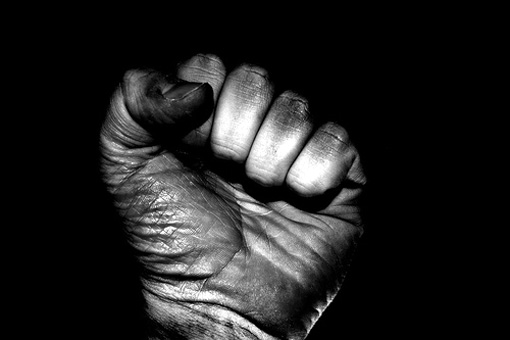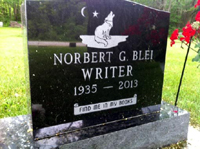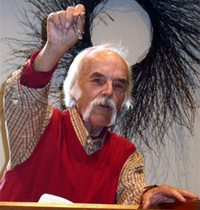
Poetry Dispatch No. 241| June 15, 2008
Poems for the Father #5
David Pichaske
in celebrations of Father’s Day, June 15, 2008
On my small shelf of poetry books devoted entirely to “father” this one, THE FATHER POEMS by David Pichaske, is among my very favorites–a book I open throughout the year and discover yet something else I needed to know about fatherhood. It’s also a favorite because I pursued the possibility of this collection, having read only a few of the individual poems, and happily, proudly, finally published a limited edition in 2005. They deserve a wider, appreciative audience, simply because they are so damn good. They speak to our age, our time, the role of parents on our own families. In fifty-five pages, twenty-seven perfect poems, David Pichaske covers the entire spectrum of the father experience, with heart, humor, and head. I especially love the last poem included here, “Opinions and Facts”—where the poet brings in the Grandfather’s voice as well. Norbert Blei
![]()
Teach Your Children Well
“and feed them on your dreams”
—Crosby, Stills, Nash & Young
Can tell you only what I have come to know:
clean, black cut of new-paved road
(always north and always uphill)
flanked by yellow beans and khaki corn;
behind, hollow moon dragging her sullen face
toward dark tangle of the Yellow Medicine River
(cottonwood, deer, fox, and pheasant);
ahead, flame of northern lights, aurora borealis,
and, always, firm distance of the pole star.
![]()
The Raised Fist of the Father
“I am speaking of heights more than fathers,
though the two tend to go together.” —David Allen Evans
We have seen him only in the briefest moments,
distanced, silhouetted against the setting sun.
His head is thrown back, his mouth open
in a cry of anger, pain, or exaltation,
his fist clenched in admonition, defiance, or joy.
His hair is full, the body without sex,
that of a Sioux warrior or the young Christ.
The clothing is indistinct, and
the voice too remote to be understood.
Perhaps it is the surprised cry of the soldier
felled by a sniper in Iraq or Vietnam.
Perhaps it is a cry of triumph,
at Marathon or after the last game of the World Series.
Perhaps it’s a warning: do not come where I am.
Sometimes we hear in it nothing more than a toast,
in French or Gaelic,
in a Montmartre cafe or a Dun Loaghaire pub.
Maybe this is Martin Luther
hammering his theses to a church door.
Perhaps this is Pete Townshend,
throwing the neck of a broken guitar to fans.
Perhaps this man is singing or dancing,
or possibly he is just sore at his kids.
Maybe he’s drunk or unsteady, or
has twisted his ankle and is falling backwards.
At this distance, who can tell?
Perhaps the fist is not a fist, but a waving hand;
perhaps the voice is not a cry, but a call.
![]()
Opinions and Facts
“We’re learning about opinions and facts.
This is very hard stuff.”
—Megan Pichaske
You’re darned tootin’.
Half the teachers at my school
wouldn’t know a hawk from a handsaw
whichever way the wind was blowing.
Feelings pass for ideas these days,
and ideology masquerades as truth.
Put that down for a fact.
Scientists usually get things right:
organic chemistry is not “how I feel.”
The speed of light is not “gender biased.”
The etiology of AIDS is not “homophobic.”
And the athletes—they understand:
You kick this ball into that net.
Throw the ball, hit the ball, catch the ball.
It wasn’t post-colonial racism blocked your spike,
Not the patriarchy blocked that free throw.
These are facts a smart girl knows.
Here’s a few others:
Megan Pichaske is the smartest kid
in the whole second grade.
Matthew Pichaske rocks.
Addison Pichaske rules.
Your mommy and daddy love you.
God exists—without qualms.
You can’t argue with an ideologue,
because they’re not very smart.
Put these down as facts.
Your grandpa told you so.
 from THE FATHER POEMS, David Pichaske, Cross+Roads Press, PO Box 33 Ellison Bay, WI 54210, $10
from THE FATHER POEMS, David Pichaske, Cross+Roads Press, PO Box 33 Ellison Bay, WI 54210, $10


















 Robert Hayden (August 4, 1913 – February 25, 1980) was an American poet, essayist, educator and Poet Laureate Consultant in Poetry to the Library of Congress.
Robert Hayden (August 4, 1913 – February 25, 1980) was an American poet, essayist, educator and Poet Laureate Consultant in Poetry to the Library of Congress.


























































Recent Comments